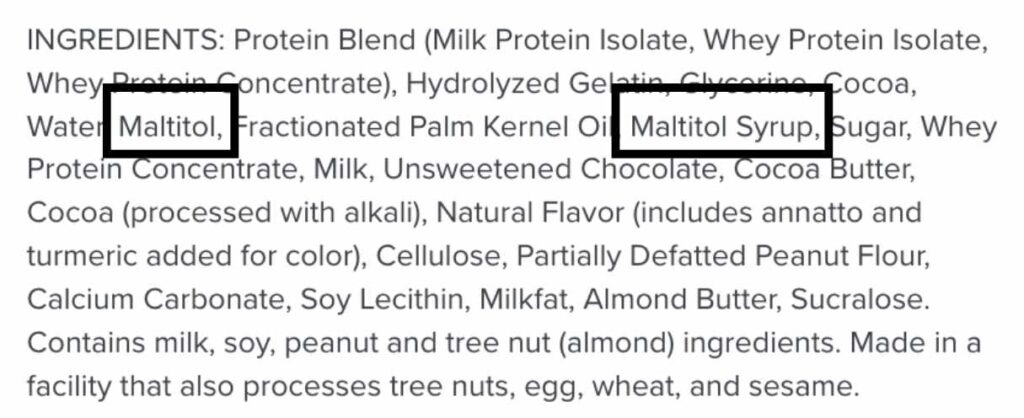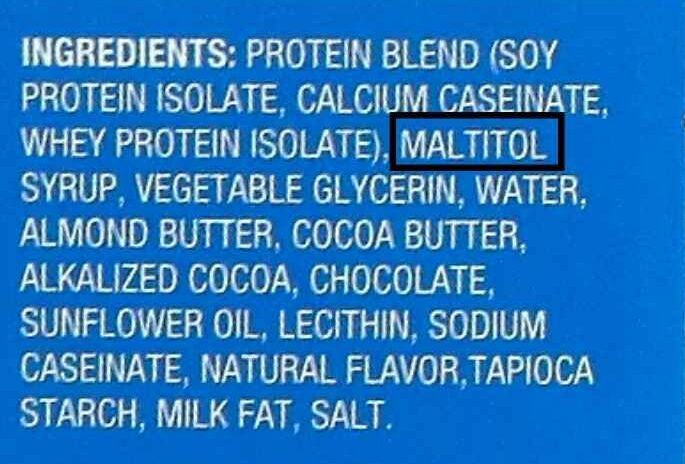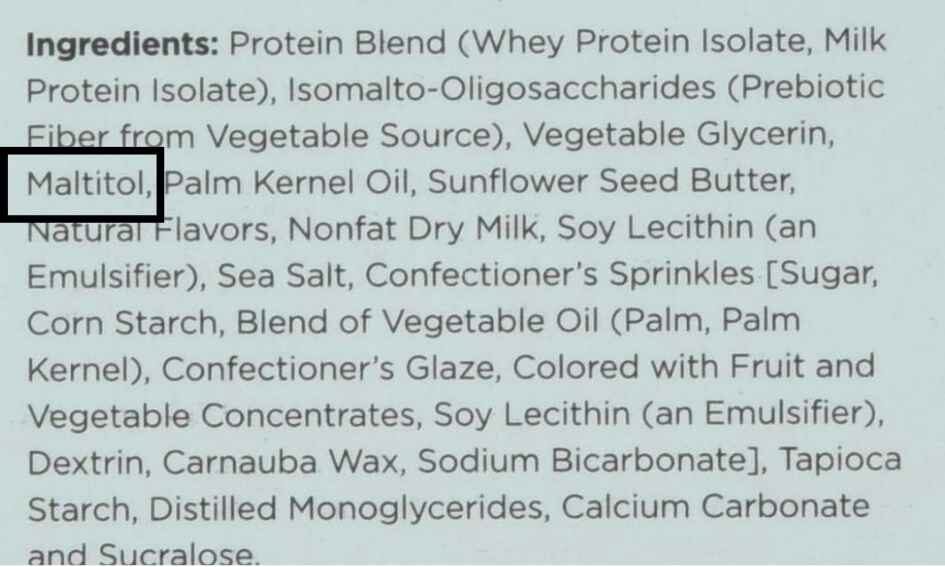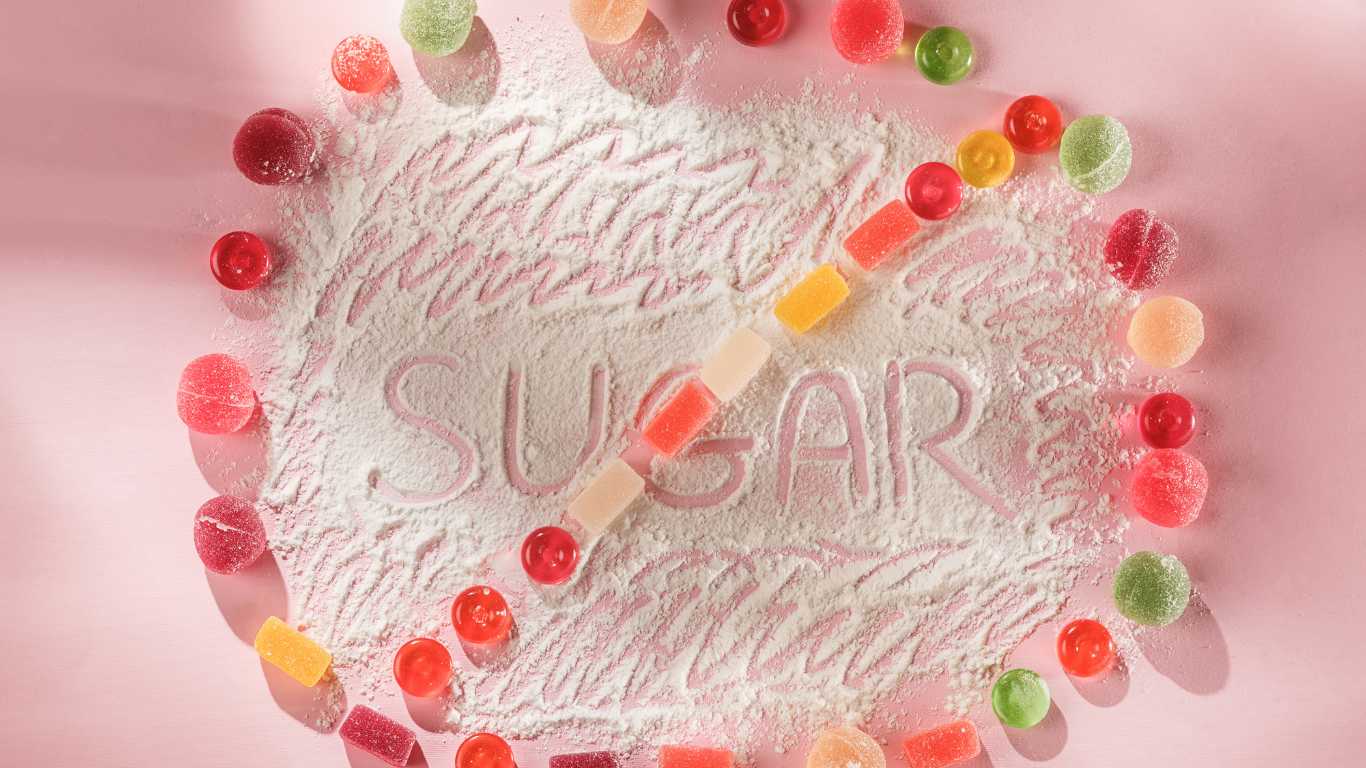Is Maltitol bad for you? You may have noticed the ingredient Maltitol in your favorite protein bar and wondered what it was and how it can affect your health. We break down everything you need to know about this popular sugar replacement.
What is Maltitol
Maltitol is a type of sugar alcohol. Sugar alcohols are non-sugar sweeteners commonly added to low-calorie or sugar-free foods such as protein bars, candy, and sweets. Though sugar alcohols are naturally present in some fruits such as berries, plums, and apples, most sugar alcohols added to packaged foods are manufactured for large-scale use in the food industry. Maltol, for example, is made through a reaction with Maltose found in corn, wheat, or potatoes. Maltose is a form of starch made from two glucose molecules bonded together. To create Maltitol, Maltose goes through a reaction called hydrogenation, which adds an additional hydrogen to the chemical structure (1).
Maltitol Uses
Maltitol has been used in mainstream products in the food industry since the 1990s. It is commonly found as an ingredient in low-sugar protein bars or granola bars, sugar-free candy, and low-sugar baked goods. When ingested, maltitol is poorly absorbed in the digestive tract and therefore has a lower glycemic impact and calorie content than sugar, with 2 calories per gram compared to 4 calories per gram of sugar. It is 75-90% as sweet as sugar and has similar properties, allowing it to replace sugar in low-calorie or low-sugar packaged foods (1).

Is Maltitol Bad for you? Review of Maltitol and Health
Is Maltitol Bad for Digestion?
When Maltitol enters the digestive tract, it is only partially digested and absorbed in the upper part of the small intestine. The remaining Maltitol enters the lower intestine and colon. When large amounts of Maltitol enter the lower digestive tract, it is fermented by gut bacteria and can cause digestive side effects, such as gas, cramping and diarrhea. Moderate amounts of Maltitol are tolerated well by most healthy individuals. However, consumption of more than 20-30g of sugar alcohol per day is generally not recommended due to the increased risk of side effects (1, 4).
One exception to this is in individuals with Irritable Bowel Syndrome (IBS). Maltitol is a type of Polyol, also known as a FODMAP. FODMAPs are types of carbohydrates in the diet that are fermented in the large intestine and can trigger digestive symptoms in people with IBS. For this reason, some people with IBS may need to avoid sugar alcohol intake altogether, as they can cause gas, bloating, pain, and diarrhea, even in small amounts (2).
Is Maltitol Bad For The Gut Microbiome?
Some early research has indicated that non-sugar sweetener intake can cause negative changes in the gut microbiome. However, not all non-sugar sweeteners seem to have the same effect. One study looking at the impact of sweeteners on gut microbiota showed that those who consumed chocolate sweetened with 23g of Maltitol had increased bifidobacteria in the gut compared to those who consumed sugar-sweetened chocolate. This means that using Maltitol instead of sugar may have a positive prebiotic effect in the gut. However, more research is needed on the long-term effects of Maltitol consumption on gut health and the microbiome (3).
Will Maltitol Cause Dental Carries?
Maltitol is resistant to bacteria in the mouth and won’t promote tooth decay or cause dental carries as sugar does (4).

Does Maltitol Increase Blood Sugars?
Since sugar alcohols are only partially digested and absorbed, they do not impact blood sugars as much as sugar. This is even the case for Maltitol, which is one of the best-absorbed forms of sugar alcohol. A review of the glycemic impact of Maltitol consumption concluded that based on available human studies, Maltitol appears to be an effective alternative to sugar for glycemic control as it results in a much lower glycemic and insulin response compared to sugar consumed in the same amount (1, 5).
Maltitol and Weight Loss
The effectiveness of non-sugar sweeteners such as maltitol on weight loss remains controversial. While maltitol can aid in reducing the calorie content of foods when replacing sugar, some experts question the ability to support factors essential to long-term weight loss, such as managing cravings, creating sustainable behaviour change, and following a long-term calorie deficit.
The World Health Organization (WHO) recently released recommendations on the use of non-sugar sweeteners for the purpose of weight loss. WHO concluded that while research shows that the use of non-sugar sweeteners in replace of sugar demonstrates lower body weight in short-term studies, long-term studies on non-sugar sweetener use demonstrate an increase in BMI and risk of obesity (6). Basically, these products help individuals follow a calorie deficit in the short term, but this deficit is generally not sustained over a longer period of time, leading to weight re-gain and higher BMI in the long-term.
My opinion on Maltitol and weight loss: we know from decades of weight loss research that sustainable, long-term weight loss is most challenging for individuals. We also know that weight loss has to do with overall eating patterns and behaviour change, making it a much more complex issue than simply swapping your sugary candy for a sugar-free version. While sugar alcohol, such as Maltitol, may help individuals enjoy their favorite sweets and remain in a calorie deficit, it’s important to consider that the same benefit can be had from simply reducing sweetened items altogether. Doing so may help to create more sustainable behaviour change that can result in improved diet quality and better nutrition status overall.

Bottomline: Is Maltitol Bad For You?
Pros: Maltitol is a suitable replacement for sugar when consumed in small doses. It has a reduced impact on blood sugars, reduced risk of dental carries, and may provide a benefit to gut bacteria when consumed instead of sugar.
Cons: Maltitol can cause digestive side effects such as gas, cramping, and diarrhea, especially when consumed in larger doses. In addition, swapping sugar-sweetened items in the diet for Maltitol-sweetened items will not necessarily improve the overall quality of your diet or support long-term weight loss.
Bottomline: I suggest reducing both your added sugar and non-sugar sweetener intake. When choosing between sugar-sweetened or Maltitol-sweetened items, select based on your overall diet and health considerations (blood sugar management, dental health, etc.). I also encourage you to consider the overall nutritional value of the product you are choosing. Rather than simply replacing your daily sweet treat or protein bar with a sugar-free alternative, consider a less processed and more nutritious option altogether to better support your health.
Related Posts:
- What are Natural Flavours and Should You Avoid Them?
- Lecithin – Food Ingredient Review
- 9 Best low sugar granola bars and Snack Bars
Sources:
- Saraiva A, Carrascosa C, Raheem D, Ramos F, Raposo A. Maltitol: Analytical Determination Methods, Applications in the Food Industry, Metabolism and Health Impacts. Int J Environ Res Public Health. 2020 Jul 20;17(14):5227. doi: 10.3390/ijerph17145227. PMID: 32698373; PMCID: PMC7400077.
- Mansueto P, Seidita A, D’Alcamo A, Carroccio A. Role of FODMAPs in Patients With Irritable Bowel Syndrome. Nutr Clin Pract. 2015 Oct;30(5):665-82. doi: 10.1177/0884533615569886. Epub 2015 Feb 18. PMID: 25694210.
- Beards E, Tuohy K, Gibson G. A human volunteer study to assess the impact of confectionery sweeteners on the gut microbiota composition. Br J Nutr. 2010 Sep;104(5):701-8. doi: 10.1017/S0007114510001078. Epub 2010 Apr 7. PMID: 20370946.
- Sugar Alcohols (Polyols) and Polydextrose Used as Sweeteners in Foods – Food Safety – Health Canada, 2005.
- Msomi NZ, Erukainure OL, Islam MS. Suitability of sugar alcohols as antidiabetic supplements: A review. J Food Drug Anal. 2021 Mar 15;29(1):1-14. doi: 10.38212/2224-6614.3107. PMID: 35696228; PMCID: PMC9261844.
- Use of non-sugar sweeteners: WHO guideline, 2023.


